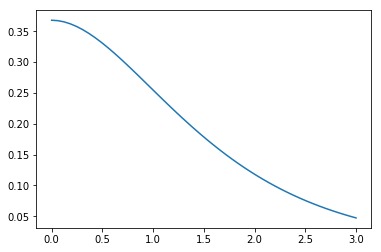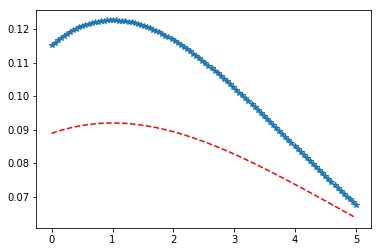scipy.stats.gumbel_r()是right-skewed Gumbel连续随机变量,使用标准格式和一些形状参数定义了该变量以完成其规格。

参数:
-> q :上下尾概率
-> x :分位数
-> loc :[可选]位置参数。默认值= 0
-> scale:[可选]比例参数。默认值= 1
-> size :[int型元组,可选]形状或随机变量。
-> moments:[可选]由字母['mvsk']组成; “ m” =均值,“ v” =方差,“ s” = Fisher的偏度,“ k” = Fisher的峰度。 (默认=“ MV”)。
Results:Right-Skewed Gumbel连续随机变量
代码1:创建right-skewed Gumbel连续随机变量
from scipy.stats import gumbel_r
numargs = gumbel_r .numargs
[] = [0.7, ] * numargs
rv = gumbel_r ()
print ("RV:\n", rv) 输出:
RV: <scipy.stats._distn_infrastructure.rv_frozen object at 0x000001E39A4600F0>
代码2:right-skewed Gumbel随机变量和概率分布
import numpy as np
quantile = np.arange (0.01, 1, 0.1)
# Random Variates
R = gumbel_r .rvs(scale = 2, size = 10)
print ("Random Variates:\n", R)
# PDF
R = gumbel_r .pdf(quantile, loc = 0, scale = 1)
print ("\nProbability Distribution:\n", R)输出:
Random Variates: [ 0.55349097 -0.36709655 -0.25581806 -0.81730142 0.28719592 -0.30831366 -2.69858598 -0.23586469 -1.01965346 6.44132721] Probability Distribution: [0.36786111 0.36573943 0.36038433 0.35223844 0.34175873 0.32939568 0.31557754 0.3006994 0.28511631 0.26913983]
代码3:图形表示。
import numpy as np
import matplotlib.pyplot as plt
distribution = np.linspace(0, np.minimum(rv.dist.b, 3))
print("Distribution:\n", distribution)
plot = plt.plot(distribution, rv.pdf(distribution))输出:
Distribution: [0. 0.06122449 0.12244898 0.18367347 0.24489796 0.30612245 0.36734694 0.42857143 0.48979592 0.55102041 0.6122449 0.67346939 0.73469388 0.79591837 0.85714286 0.91836735 0.97959184 1.04081633 1.10204082 1.16326531 1.2244898 1.28571429 1.34693878 1.40816327 1.46938776 1.53061224 1.59183673 1.65306122 1.71428571 1.7755102 1.83673469 1.89795918 1.95918367 2.02040816 2.08163265 2.14285714 2.20408163 2.26530612 2.32653061 2.3877551 2.44897959 2.51020408 2.57142857 2.63265306 2.69387755 2.75510204 2.81632653 2.87755102 2.93877551 3. ]

代码4:更改位置参数
import matplotlib.pyplot as plt
import numpy as np
x = np.linspace(0, 5, 100)
# Varying positional arguments
y1 = gumbel_r .pdf(x, 1, 3)
y2 = gumbel_r .pdf(x, 1, 4)
plt.plot(x, y1, "*", x, y2, "r--")输出:

相关用法
- Python Scipy stats.chi()用法及代码示例
- Python Scipy stats.f()用法及代码示例
- Python Scipy stats.exponpow()用法及代码示例
- Python Scipy stats.percentileofscore()用法及代码示例
- Python Scipy stats.exponweib()用法及代码示例
- Python Scipy stats.bradford()用法及代码示例
- Python Scipy stats.halflogistic()用法及代码示例
- Python Scipy stats.fatiguelife()用法及代码示例
- Python Scipy stats.gompertz()用法及代码示例
- Python Scipy stats.skew()用法及代码示例
- Python Scipy stats.sem()用法及代码示例
- Python Scipy stats.halfnorm()用法及代码示例
- Python Scipy stats.fisk()用法及代码示例
- Python Scipy stats.beta()用法及代码示例
- Python Scipy stats.cosine()用法及代码示例
注:本文由纯净天空筛选整理自vishal3096大神的英文原创作品 scipy stats.gumbel_r() | Python。非经特殊声明,原始代码版权归原作者所有,本译文未经允许或授权,请勿转载或复制。
